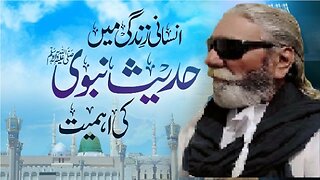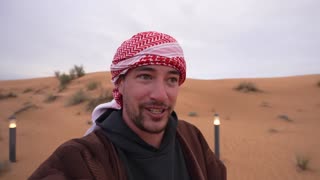Premium Only Content

Rabi-ul-Awwal Special Biography of Prophet Muhammad (PBUH) Part-2 سیرت نبوی صلی اللہ علیہ وسلم
@quranhadithlight #seeratunnabi #prophetmuhammad #lifeofprophet #seerah #rasoolallah #islamichistory #sirahnabawi #makkahmadinah
#farewellsermon #quranhadith #seeratnabi #biographyprophet #sunnah #islamicvideos #islamicchannel #prophetstory #seerahmubarak #propheticlife #lightofislam #siratunabi #part2
Biography of Prophet Muhammad (PBUH) Childhood (Part-2)
Assalamu Alaikum wa Rahmatullahi wa Barakatuhu!
Welcome back to our blessed series on the Biography of Prophet Muhammad (PBUH). Yesterday, in Part One, we reflected upon his noble birth and the miraculous events that surrounded his arrival into this world. We saw how Allah prepared the way for His final Messenger, sending him into a land filled with darkness, ignorance, and idol worship — so that he could become the beacon of light for all humanity.
Today, we continue with Part Two: His Childhood and Youth. The Prophet (PBUH) faced many trials early in life, including the loss of both his parents, yet Allah nurtured him under His divine protection. From his days as a shepherd to his years as a merchant, every step of his upbringing carried signs of the future Prophet. His honesty and truthfulness earned him the titles As-Sadiq (the Truthful) and Al-Amin (the Trustworthy).
In this part, we will explore his youth, his noble character, and the way Allah Almighty prepared him for the greatest mission in history. Tomorrow, insha’Allah, we will move forward to Part Three: The Beginning of Prophethood (PBUH).
The childhood of Prophet Muhammad (PBUH) is a story of trials, blessings, and divine protection. From the very first days of his life, he was raised not merely as a child of Quraysh, but as a child under the direct care of Allah , who was preparing him for the greatest mission entrusted to any human being. His early years were marked by events that shaped his character, instilled patience and reliance on Allah, and demonstrated his purity and noble qualities even before prophethood.
After his birth, as was the custom of the Quraysh, he was given to a wet nurse to be raised in the open desert, where the air was cleaner and the Arabic language was spoken in its purest form. The noble woman Halimah al-Sa‘diyah was chosen by divine decree to become his foster mother. Initially, Halimah had not intended to take the orphan child, for she, like the other women, hoped to nurse a child whose father could provide generous rewards. But as all the other infants had been taken and she was left without choice, she reluctantly agreed to take Muhammad (PBUH). Yet, from that moment on, she found her life filled with blessings.
Halimah later recounted that before taking Muhammad (PBUH), her she-camel was weak and barren, and her donkey was too slow to keep up with the caravan. But once the blessed child was with her, her donkey outpaced the others, her camel gave milk in abundance, and her entire household flourished. She and her husband realized that this child carried blessings unseen before. The other women of the tribe even admitted their envy, for none of them experienced such fortune. Halimah grew deeply attached to Muhammad ? and kept him in her care longer than was customary, for she did not wish to part with him.
During his years in the desert, the young Muhammad (PBUH) grew strong, healthy, and eloquent. He was known for his intelligence, calm demeanor, and striking beauty. His foster brothers and sisters loved him, and the tribe treated him with affection. Yet, even in this peaceful environment, extraordinary events marked him as someone chosen for a special destiny.
One such event was the incident of the “splitting of the chest.” When Muhammad (PBUH) was around four years old, he was playing with his foster brothers in the desert. Suddenly, the Angel Jibreel (Gabriel) appeared, laid him down, and opened his chest. The angel removed his heart, extracted a black clot, and said, “This is the portion of Shaytan (Satan) in you.” Then his heart was washed in a vessel of pure water from Zamzam and returned to its place. Halimah and her family were terrified when the children ran to tell them that Muhammad had been taken. When they found him, his face was pale, but he was unharmed. This miraculous event is narrated in authentic Hadith, such as in Sahih Muslim (Hadith 162): “Then Jibreel took him, opened his chest, took out the heart, and extracted a clot of blood, and said: ‘This is the share of Shaytan in you.’ Then he washed it in a vessel of gold with Zamzam water, and it was joined together and restored.”
Halimah and her husband feared for the boy’s safety after this event, believing that something extraordinary was happening to him. They decided to return him to his mother Amina earlier than planned, worried that unseen forces might harm him. When Amina heard the story, she was not alarmed. She reassured them, telling them that she had seen visions before his birth indicating his special destiny. She knew that her son was under divine protection.
Muhammad (PBUH) lived with his mother for a short time after his return. When he was six years old, Amina decided to take him on a journey to visit his relatives in Yathrib (later called Madinah). She wanted him to see the grave of his father Abdullah and to meet members of her family from the tribe of Banu Najjar. The journey was long, but it gave Muhammad (PBUH) an early taste of travel and the experience of seeing life beyond Makkah. However, tragedy struck on the way back. In a place called Abwa, Amina fell seriously ill and passed away. Muhammad (PBUH), only six years old, was left an orphan once more, having already lost his father before his birth.
This was a heavy trial for a young child, but Allah was preparing His Messenger through these difficulties. As the Qur’an says in Surah Ad Duha verse 6: “Did He not find you an orphan and give you shelter?”. After the death of his mother, Muhammad (PBUH) was taken into the care of his grandfather, Abdul Muttalib, the respected chief of Quraysh. Abdul Muttalib loved his grandson dearly and gave him special attention. He would often seat Muhammad (PBUH) beside him on his mat near the Ka‘bah, even though his own sons were not allowed to sit there. When people tried to stop the young boy, Abdul Muttalib would say, “Leave him, for by Allah, this son of mine has a great future.”
Under Abdul Muttalib’s care, Muhammad (PBUH) continued to grow with dignity and grace. Yet, another test awaited him. Just two years later, when he was eight years old, Abdul Muttalib passed away. With his death, guardianship of Muhammad (PBUH) passed to his uncle Abu Talib, the brother of Abdullah. Though not wealthy, Abu Talib loved Muhammad (PBUH) deeply and treated him as one of his own children. He would later become one of the strongest supporters of the Prophet (PBUH) during his mission, protecting him from the Quraysh despite never embracing Islam himself.
Growing up in Abu Talib’s household, Muhammad (PBUH) experienced the life of the Quraysh more closely. He saw their trade caravans, their dealings with tribes, and their worship at the Ka‘bah. Yet, even as a child, he was different from his peers. He did not bow to idols, nor did he participate in the corrupt practices common among the Quraysh. He was known for his honesty, humility, and kindness. Other children of his age played recklessly, but Muhammad (PBUH) was thoughtful, calm, and respectful.
From an early age, he took responsibility for himself. Seeing the poverty of his uncle’s household, he chose to work and help rather than burden the family. He began by grazing sheep in the hills of Makkah, a humble job but one that built patience, resilience, and empathy. The Prophet (PBUH) would later remind his companions of this experience, saying in Sahih al Bukhari Hadith 2143: “There was no prophet who was not a shepherd.” When asked, “Even you, O Messenger of Allah” he replied: “Yes, I used to tend sheep for the people of Makkah in exchange for some qirats.”. This work taught him responsibility and built the leadership qualities that would later serve him in guiding the Ummah.
Despite being an orphan, Muhammad (PBUH) was never abandoned by Allah. The people of Makkah grew to admire his character. He was truthful, never lied, never betrayed trust, and never participated in the immoral behavior that plagued society. Even in his youth, he was known as “al-Amin” (the Trustworthy). People felt safe leaving their valuables with him, knowing he would never deceive them. This reputation followed him throughout his life, paving the way for his acceptance as a Prophet later on.
One significant event during his childhood was the famous Hilf al-Fudul, the “Alliance of the Virtuous.” Although Muhammad ? was still young, he witnessed this pact among some Quraysh leaders to protect the oppressed and uphold justice. Later in his life, as a Prophet, he would recall this alliance fondly, saying in Musand Ahmed Hadith 1655: “I witnessed a pact in the house of Abdullah ibn Jud‘an that I would not exchange for the choicest of camels. And if I were called to it in Islam, I would respond.”. This showed that even as a youth, he was present in gatherings that valued justice and morality, preparing him for his role as the ultimate lawgiver of mankind.
Muhammad (PBUH) also traveled with Abu Talib on trade journeys during his childhood. One of the most notable was a trip to Syria, where a Christian monk named Bahira reportedly observed signs of prophethood in the boy. The monk noticed that a cloud shaded him wherever he went and that a mark of prophethood was visible between his shoulders. Though scholars debate the details of this story, it is often mentioned to highlight that people of other faiths had knowledge of the coming Prophet, as foretold in their scriptures. The Qur’an itself testifies in Surah Al Araf verse 157: “Those who follow the Messenger, the unlettered Prophet, whom they find written in what they have of the Torah and the Gospel...”.
Through all these stages, Muhammad (PBUH) remained pure and protected. He grew up in a society steeped in idolatry, yet he never worshipped an idol. He was surrounded by people who engaged in drinking, gambling, and immorality, yet he never participated in any of these sins. Allah shielded him, preserving his heart and soul for the mission ahead.
Thus, the childhood of the Prophet (PBUH) was not one of privilege or ease, but of trials, losses, and lessons. He experienced the pain of being an orphan, the struggle of poverty, and the challenges of responsibility at a young age. Yet, through it all, he was blessed with divine protection, noble character, and the love of those around him. His honesty, humility, and purity distinguished him from his people long before he received revelation.
Allah was shaping him to be a man who would empathize with the weak, care for the orphan, and lead with justice. His childhood was the foundation of his prophetic mission, a preparation that combined hardship with mercy, trial with blessing. As the Qur’an reminds us, every step of his early life was under the care of Allah in Surah Alam Nashrah verse 1-4: “And did We not expand for you, [O Muhammad], your breast? And We removed from you your burden, which had weighed upon your back, and raised high for you your repute.”.
In this way, the boy who grazed sheep in the hills of Makkah, who lost his parents and was raised an orphan, grew into the man who would one day be entrusted with guiding humanity to the worship of the One true God.
Alhamdulillah, with the mercy of Allah, we have completed the second part of the biography of Prophet Muhammad (PBUH). In this part, we reflected on his childhood, his noble character as a youth, and the way he earned the titles of As-Sadiq (the Truthful) and Al-Amin (the Trustworthy). Even before receiving revelation, his life was a shining example of honesty, dignity, patience, and moral strength. These qualities prepared him for the great responsibility of prophethood that was to come.
But the greatest turning point of his life — and for all of humanity — was yet to arrive. That life-changing moment was the descent of revelation in the Cave of Hira, when Jibreel (AS) came with the first verses of the Qur’an.
Insha’Allah, tomorrow we will continue with Part Three: The Beginning of Prophethood, where we will explore the first revelation, the early years of da’wah, the challenges in Makkah, and the growing mission of Islam.
Stay with us as we move closer to the heart of his blessed mission.
Allah Hafiz
===================================
-
 7:50
7:50
ISLAMIC HISTORY
11 hours agoIntroductory Words for Hadith Nabawi | Importance of the Prophetic (PBUH) Hadith in human life
12 -
 40:44
40:44
SouthernbelleReacts
7 days ago $1.97 earned“Event Horizon (1997) Reaction | Hellraiser in Space with Sam Neill & Laurence Fishburne”
20.4K4 -
 10:49
10:49
Artur Stone Garage
3 days ago $1.79 earnedI Spent $2000 on My Turbo Honda Civic Build (Before & After)
22.6K7 -
 0:44
0:44
Danny Rayes
17 hours ago $2.39 earnedDid Someone Know It Was Going To Happen?
22.4K7 -
 15:03
15:03
World2Briggs
1 day ago $2.24 earnedShocking Home Prices in Florida's Cheapest Towns!
22.3K6 -
 58:02
58:02
ChopstickTravel
4 days ago $0.82 earnedBillionaire Food in Dubai 🇦🇪 Super Luxury MICHELIN +WAGYU + CAVIAR in UAE!
16.6K1 -
 21:20
21:20
Advanced Level Diagnostics
12 days ago $1.06 earned2020 Toyota Sienna - Crank No Start! Never Seen This Before!
20.4K2 -
 49:04
49:04
The Why Files
6 days agoMajestic 12 | Secret Documents Expose UFO Cover-Up Vol. 1
56.5K70 -
 12:29
12:29
The Quartering
21 hours agoFBI Admits ACCOMPLICE In Charlie Kirk Assassination! Ring Doorbell Camera Footage & Phone Calls!
143K461 -
 30:41
30:41
Crowder Bits
1 day agoEXCLUSIVE: Charlie Kirk Eyewitness Details Shooting "Sacrifice Your Life For What You Believe In."
59.6K141